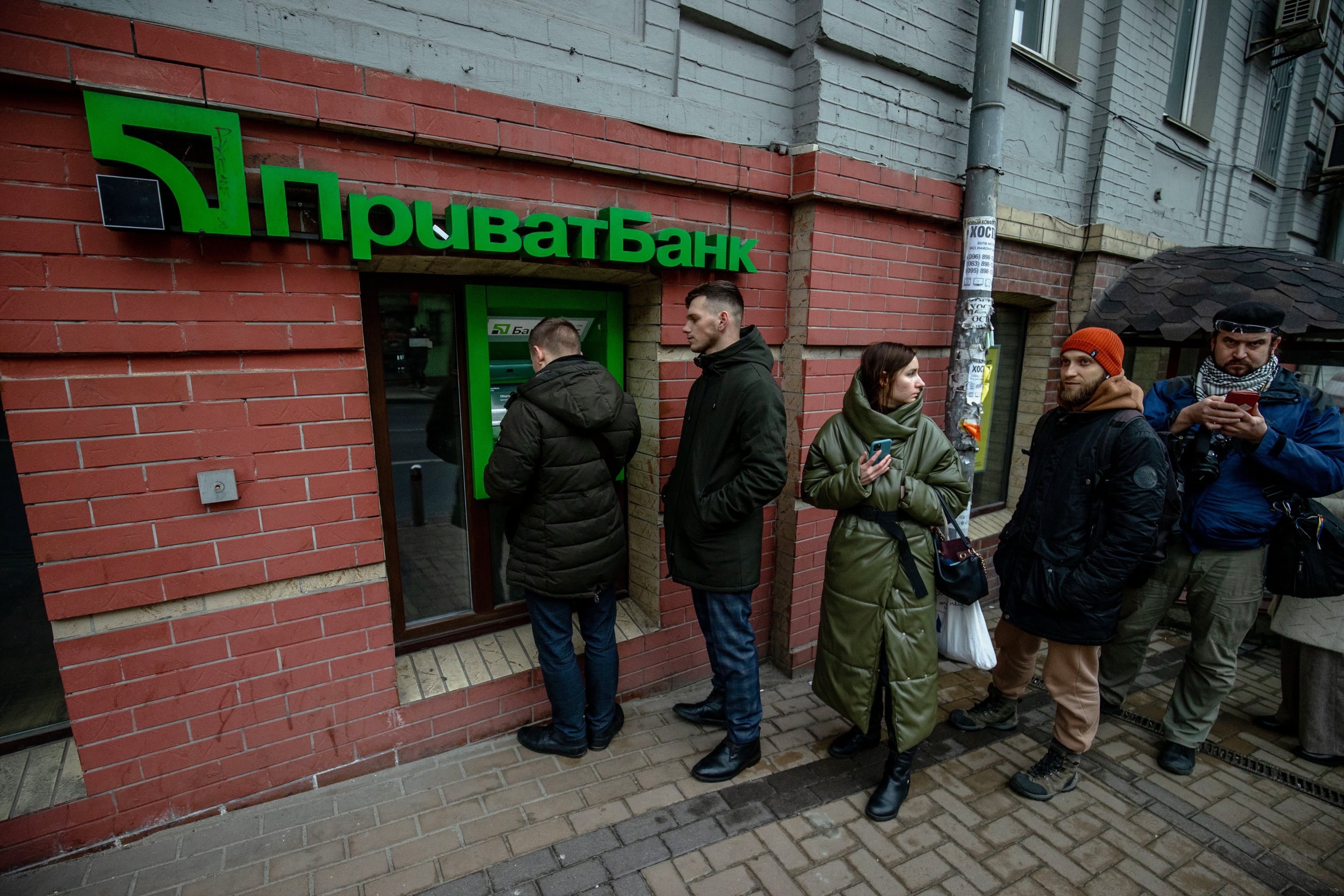Penalties levied by the U.S. and foreign governments have crippled Russia’s economy in the last 24 hours by freezing about half of the nation’s central bank assets, U.S. officials say.
The economic sanctions imposed by the U.S. and its allies have sent Russians scrambling to spend their rubles while withdrawing dollars, euros and other currencies from banks as the value of their local cash plunged.
The U.S. penalties come in addition a growing effort to bar Russian banks from the SWIFT global payments system, the financial-messaging platform that links the globe’s biggest banks. Preventing Russian banks from using the system quashes cross-border financing critical to a modern economy, including trade, foreign investments and central banking supports, according U.S. Treasury Department spokeswoman Lily Adams.
“The range of outcomes is wide and the ripple effects from the severe sanctions on Russia will have further consequences for the global economy, markets, and inflation,” wrote Keith Lerner, chief markets strategist at Truist Advisory Services. “The repercussions will be long lasting as the world rethinks the relationship they have with Russia.”
But while markets sort out the high-level impact of sanctions, everyday Russians are already seeing the impact of the penalties. Many have clamored to ATMs to wait in lines dozens deep in the hopes of withdrawing cash before they’re unable to exchange currency for groceries and other necessities.
“Since Thursday, everyone has been running from ATM to ATM to get cash. Some are lucky, others not so much,” St Petersburg resident, Pyotr, who declined to give his last name, told Reuters.
Moscow’s department of public transport warned city residents over the weekend that they could run into problems paying for fare using Apple Pay, Google Pay and Samsung Pay because VTB Bank, one of the Russian lenders targeted by global sanctions, handles payments in the metropolis.
By blocking the Russian government’s access to its overseas bank accounts, the U.S. and its partners effectively close off Moscow’s access to dollars, euros and yen. That ultimately restricts any Russian citizen’s ability to purchase any goods not sold in rubles.
“The Russian ruble has depreciated massively,” said Komal Sri-Kumar, president of Sri-Kumar Global Strategies. “Expect much higher inflation rates: The ruble depreciating meaning that people’s savings are going to be wiped out.”
Part of the problem is Russia’s historic reliance on currencies beyond the ruble.
Even in calmer times, the ruble was known for volatility. Average Russians and oligarchs alike needed a way to preserve the value of their wealth that wouldn’t whipsaw on a day-to-day basis in an economy linked closely to the fate of the health of the energy sector.
To help satisfy that demand for stability, Russia’s central bank kept huge sums of its own wealth denominated in U.S. dollars to serve that need. But that means that the U.S. sanctions remove that critical financial anchor.
“The unprecedented action we are taking today will significantly limit Russia’s ability to use assets to finance its destabilizing activities, and target the funds [Russian President Vladimir] Putin and his inner circle depend on to enable his invasion of Ukraine,” said U.S. Treasury Secretary Janet Yellen.
Reflecting that fear, the ruble swooned following the Treasury Department latest efforts to freeze Russia’s access to its American bank accounts. At one point, traders were asking for 110.77 rubles for every dollar, up from 83 rubles on Friday. At that time, rubles were worth 20% less than they were just a few days ago.
Such a drop in the value of the ruble would ultimately translate into a lower standard of living for Russians. Any goods or commodities Moscow imports — from wheat and soybeans to medical supplies — will be magnitudes more expensive.
Foreign travel is much more difficult given restrictions on Russian airlines and foreign reluctance to accept rubles in exchange for fare. And, if Russian President Vladimir Putin doesn’t yield to the globe’s demands to end its invasion, the country’s factories and manufacturers may need to close thanks to closed trading routes.
The Russian central bank, the Bank of Russia, stepped in early Monday to protect the country’s financial system by raising interest rates to 20% from 9.5%. Russian official hope that the move will encourage savers to leave deposits in the banking system, prevent more bank runs and ensure that cash can still flow.
The exchange rate between the U.S. dollar and the Russian ruble recovered somewhat following the central bank’s action.
But the central bank’s efforts also mean it is now much more expensive to borrow in Russia and are likely to dampen economic growth even further.
Investors are also increasingly worried that Moscow won’t be able to pay off its debt with interest rates so high. The yield on a Russian dollar bond maturing in 2024 was last seen trading north of 13%, up from under 10% earlier in February.
“The interest rate is going to put the Russian economy into a stranglehold,” Sri-Kumar added. “I have continued to be a fan of the policy followed by the Russian central bank. But even the central bank cannot deal with the situation Russia is going through.”
— CNBC’s Amanda Macias contributed to this report. Reuters also contributed.
